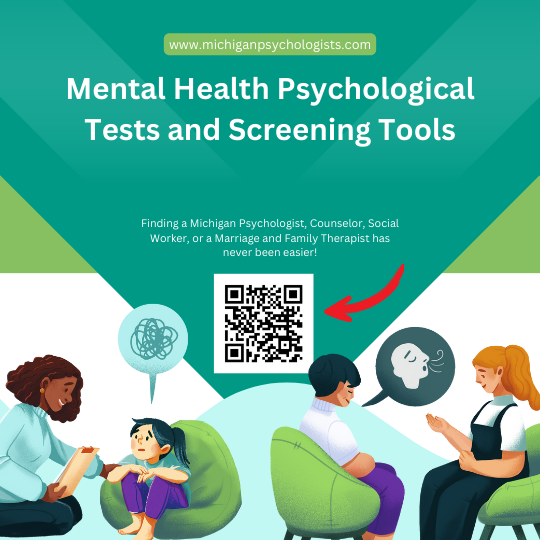Psychological Tests
Home » Psychological Tests

Table of Contents
Get Insight with Our Free Comprehensive Psychological Screeners
- Autism: Autism Spectrum Quotient (AQ): Ages 16+
- Autism: Take the Autism Spectrum Screening Questionnaire (ASSQ) Ages: 6-17
- Autism: Childhood Autism Spectrum Test (CAST) Ages: 4-11
- Autism: The Quantitative Checklist for Autism in Toddlers (Q-CHAT) Ages: <4
- ADHD: The Adult ADHD Self-Report Scale (ASRS)
- ADHD: Vanderbilt ADHD Diagnostic Rating Scale (VADRS): Ages 6-12
- Anxiety: The Generalized Anxiety Disorder 7 Item Scale (GAD-7)
- Anxiety: Hamilton Anxiety Rating Scale (HAM-A)
Mental health is a crucial aspect of overall well-being, and understanding your mental health is the first step towards managing it effectively. Our collection of psychological tests, screeners, and quizzes is designed to help you gain insight into various aspects of your mental and emotional health. These tools are scientifically validated and serve as preliminary indicators of potential mental health concerns. While they are not diagnostic tools, they can provide valuable information that may prompt you to seek further professional evaluation and support.
Types of Psychological Tests and Screeners
1. Addiction Screeners
- Purpose: Identify signs of substance use disorders and behavioral addictions.
- Examples: Alcohol Use Disorders Identification Test (AUDIT), Drug Abuse Screening Test (DAST).
2. ADHD Screeners
- Purpose: Assess symptoms of Attention Deficit Hyperactivity Disorder (ADHD) in both children and adults.
- Examples: Adult ADHD Self-Report Scale (ASRS), Vanderbilt ADHD Diagnostic Rating Scale (VADRS), Conners’ Adult ADHD Rating Scales (CAARS).
3. Aggression Screeners
- Purpose: Measure tendencies towards aggressive behavior and anger management issues.
- Examples: Buss-Perry Aggression Questionnaire (BPAQ), State-Trait Anger Expression Inventory (STAXI).
4. Anxiety Screeners
- Purpose: Evaluate symptoms of anxiety disorders, including generalized anxiety disorder (GAD), social anxiety, and panic disorder.
- Examples: Generalized Anxiety Disorder 7 (GAD-7), Social Phobia Inventory (SPIN).
5. Autism Screeners
- Purpose: Identify traits and behaviors associated with Autism Spectrum Disorder (ASD).
- Examples: Autism Spectrum Quotient (AQ), Childhood Autism Rating Scale (CARS).
6. Bipolar Disorder Screeners
- Purpose: Detect symptoms of bipolar disorder, including manic and depressive episodes.
- Examples: Mood Disorder Questionnaire (MDQ), Bipolar Spectrum Diagnostic Scale (BSDS).
7. Depression Screeners
- Purpose: Assess the presence and severity of depressive symptoms.
- Examples: Patient Health Questionnaire-9 (PHQ-9), Beck Depression Inventory (BDI).
8. Eating Disorders Screeners
- Purpose: Identify signs of eating disorders such as anorexia, bulimia, and binge eating disorder.
- Examples: Eating Disorder Examination Questionnaire (EDE-Q), SCOFF Questionnaire.
9. OCD Screeners
- Purpose: Measure symptoms of Obsessive-Compulsive Disorder (OCD).
- Examples: Yale-Brown Obsessive Compulsive Scale (Y-BOCS), Obsessive-Compulsive Inventory (OCI).
10. Personality Assessments –
- Purpose: Explore various dimensions of personality, which can influence behavior and mental health. –
- Examples: Myers-Briggs Type Indicator (MBTI), Big Five Personality Test.
11. PTSD Screeners
- Purpose: Identify symptoms of Post-Traumatic Stress Disorder (PTSD) following a traumatic event.
- Examples: PTSD Checklist (PCL-5), Impact of Event Scale-Revised (IES-R).
How These Screeners Are Used
Screening and Initial Assessment: These tools provide an initial indication of potential mental health issues, helping individuals recognize symptoms and seek professional advice.
Monitoring and Progress Tracking: Repeated use of certain screeners can help track changes in symptoms over time, aiding in monitoring the effectiveness of treatment and interventions.
Self-Reflection and Awareness: Taking these quizzes can foster greater self-awareness and understanding of one’s mental health, promoting proactive management and self-care.
Professional Guidance: While these screeners are helpful, they are not substitutes for professional diagnosis and treatment. If your results indicate potential concerns, we strongly recommend consulting with a licensed mental health professional who can provide a comprehensive assessment and personalized care plan.
Our suite of psychological tests, screeners, and quizzes is here to support you in your mental health journey. Remember, taking a screener is just the first step. Understanding your mental health better enables you to make informed decisions about seeking help and improving your well-being. Explore our resources, and take the first step towards a healthier mind today. If you have any questions or need assistance, please feel free to reach out to us.